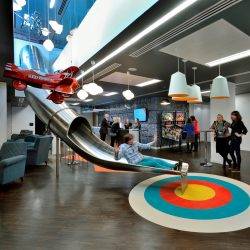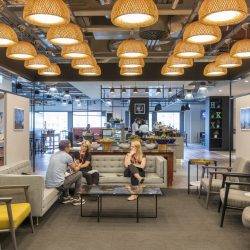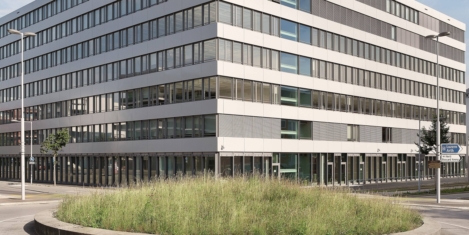December 17, 2018
Meatspace, cyberspace, the uncertainty of expertise and some other stuff
 The sign that somebody knows their stuff about a subject is often that whatever they say about it is full of questions, equivocations and caveats. They’ll often start out by saying things are complicated in mitigation of their opinion on a particular topic. They’ll say there are no silver bullets. It’s almost always neophytes, chancers and the conflicted that offer certainty. To prove my point here is David D’Souza of the CIPD making a point about the tendency to look for pat, narrow solutions to complex, broad challenges. Not only does he have something interesting to say, you know that he has the depth and breadth of knowledge to expand on each of the points he makes with yet more sophistication. It’s fractal thinking.
The sign that somebody knows their stuff about a subject is often that whatever they say about it is full of questions, equivocations and caveats. They’ll often start out by saying things are complicated in mitigation of their opinion on a particular topic. They’ll say there are no silver bullets. It’s almost always neophytes, chancers and the conflicted that offer certainty. To prove my point here is David D’Souza of the CIPD making a point about the tendency to look for pat, narrow solutions to complex, broad challenges. Not only does he have something interesting to say, you know that he has the depth and breadth of knowledge to expand on each of the points he makes with yet more sophistication. It’s fractal thinking.














 Flexible workers claim to work more effectively than those working a traditional ‘nine-to-five’, with a quarter of respondents (27 percent) in a recent poll saying they work longer hours in their new flexible working routine than they did when they worked normal office hours. The research, which was commissioned by the AAT (Association of Accounting Technicians) found that flexible workers think they put in almost seven hours more each week on average than they did previously. The research, which looked at the productivity of a group of workers who set their own hours or working location against a group of those who are not doing so, found that the former benefit from feeling happier and less stressed.
Flexible workers claim to work more effectively than those working a traditional ‘nine-to-five’, with a quarter of respondents (27 percent) in a recent poll saying they work longer hours in their new flexible working routine than they did when they worked normal office hours. The research, which was commissioned by the AAT (Association of Accounting Technicians) found that flexible workers think they put in almost seven hours more each week on average than they did previously. The research, which looked at the productivity of a group of workers who set their own hours or working location against a group of those who are not doing so, found that the former benefit from feeling happier and less stressed. 
 A new survey into happiness at work suggests it is viewed differently according to age. Baby boomers: aspire to have job security and think careers are defined by employers. Gen X: aspire to have a work-life balance and although are loyal to a profession will not necessarily stick with the same employer. Millennials or Gen Y aspire to have freedom and flexibility and are digital entrepreneurs while Gen Z aspire to have security and stability. The report by Instant Offices’ considered what is important to each age group, and how employers approach the age gap. It found that eight in 10 millennials look for a manager to act as a mentor or coach; Baby boomers want a boss to be ethical, fair and consistent, while 61 percent of Generation X, and 55 percent of millennials, think team consensus is important.
A new survey into happiness at work suggests it is viewed differently according to age. Baby boomers: aspire to have job security and think careers are defined by employers. Gen X: aspire to have a work-life balance and although are loyal to a profession will not necessarily stick with the same employer. Millennials or Gen Y aspire to have freedom and flexibility and are digital entrepreneurs while Gen Z aspire to have security and stability. The report by Instant Offices’ considered what is important to each age group, and how employers approach the age gap. It found that eight in 10 millennials look for a manager to act as a mentor or coach; Baby boomers want a boss to be ethical, fair and consistent, while 61 percent of Generation X, and 55 percent of millennials, think team consensus is important. 








 The ongoing uncertainty around Brexit has had little impact on both workers’ desire for job stability, and businesses’ assessments of their economic prospects according to Gartner’s latest Global Talent Monitor report. In fact, the UK reported the highest business confidence rating of all European countries surveyed at 60, and above the global average of 57. For employers this has the knock effect that the number of UK employees looking to stay in their current job has fallen sharply over the past 12 months, as 23 percent of employees indicated a low intent to stay with their current employer, a 13per cent increase from the same period last year and 10 percent higher than the current global average (13 percent). While fewer UK workers are committed to staying with their current employers, the number of workers who reported a higher willingness to go above and beyond at work remained flat.
The ongoing uncertainty around Brexit has had little impact on both workers’ desire for job stability, and businesses’ assessments of their economic prospects according to Gartner’s latest Global Talent Monitor report. In fact, the UK reported the highest business confidence rating of all European countries surveyed at 60, and above the global average of 57. For employers this has the knock effect that the number of UK employees looking to stay in their current job has fallen sharply over the past 12 months, as 23 percent of employees indicated a low intent to stay with their current employer, a 13per cent increase from the same period last year and 10 percent higher than the current global average (13 percent). While fewer UK workers are committed to staying with their current employers, the number of workers who reported a higher willingness to go above and beyond at work remained flat.








December 17, 2018
Don’t be a turkey, get on the commercial property gravy train
by Jo Sutherland • Comment, Property
(more…)